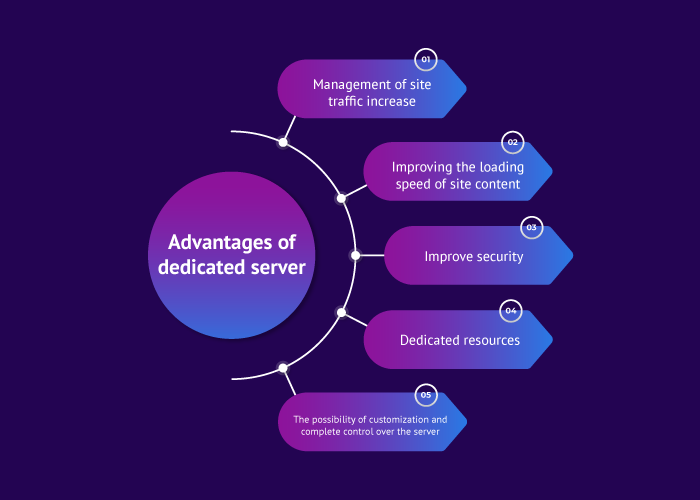What is Dedicated Server? Guide to Dedicated Server Hosting
What is Dedicated Server? A dedicated server is a hosting service where one user has authority over all server resources, providing improved website performance, security, and full control.
🤖AI Overview:
What is Dedicated Server? A dedicated server is a hosting service where all server resources are assigned to one user or website. This setup improves performance, provides enhanced security, and allows full server control for high-traffic or specialized needs.
What is a dedicated server?
A dedicated server is a hosting service that dedicates all the resources and computing power of a physical server to one website. Unlike shared hosting where resources are divided between many users, a dedicated server ensures no other websites use your server. This exclusive access is important for control and security and means your performance is never affected by others.
A dedicated server usually comes at a higher cost compared to shared hosting and VPS options. However, it is recommended for growing businesses or customers who desire maximum site performance and security.
In a dedicated server, the user is responsible for server management. This includes initial setup, applying security measures, monitoring, and regular maintenance. So it is safe to say that intermediate-level technical knowledge is required.
How Does a Dedicated Server Work?
To understand what a dedicated server is, it’s helpful to know how it works compared to other hosting types. In shared hosting, one server can serve thousands of accounts. In VPS hosting, the server is divided for fewer users using virtualization technology. With a dedicated server, all resources like CPU, RAM, and storage belong to one client site. This allows any kind of configuration or application, making it suitable for demanding functions such as websites with high traffic, gaming servers, or data-heavy business tools.
Advantages of a Dedicated Server
- Managing site traffic spikes
A dedicated server is valuable as your website’s traffic grows. With full access to server resources, your website can handle sudden traffic spikes without slowing down. This means better user experience and protection from lost revenue due to performance issues.
- Improving content loading speed
Website loading speed impacts both user experience and search engine rankings. With a dedicated server, your pages can load faster since all server resources are exclusive to you. Faster sites also improve SEO and help increase conversion rates.
- Enhancing security
Security is a key advantage of dedicated servers. They prevent risks threatening other websites, such as malware or attack vectors common with shared hosting. A dedicated server also comes with a unique IP address, helping to protect website’s SEO and reducing exposure to spam or harmful content from other users.

- Dedicated resources
All CPU, RAM, and storage resources are dedicated to your website. This prevents issues that arise in shared hosting, such as other users using too much bandwidth or memory. This consistency ensures reliable performance and stability for your operations.
- Customization and control
With a dedicated server, you have complete control over server settings and installed software. This means you can optimize every aspect of your server for your site’s needs, whether it involves specific content management systems, hardware adjustments, or security tools. This flexibility is especially useful for experienced developers and IT teams.
Best Practices for Dedicated Server Use
It is important to choose a reputable provider for your dedicated server. Always apply best security practices such as firewalls, VPN access, two-factor authentication, and regular updates. Check your hosting provider’s service guarantees and review their policies related to security, data storage, and data retention. Skilled management and regular maintenance are key to ongoing server performance.
Potential Disadvantages of a Dedicated Server
- Higher cost
A dedicated server costs more than shared or VPS hosting, so it may not suit those starting small or with tight budgets.
- Need for expertise
Managing a dedicated server requires technical skill. If you lack experience with server setup and maintenance, hiring professional help may be needed.
- Second-Class VDS providers
Make sure your provider is reputable to avoid performance or security issues. Review service terms to prevent throttling or resource limits.
- Time and effort for data migration
Moving from another hosting to a dedicated server can take extra time and possibly cause downtime. Plan such transitions carefully or start with a dedicated server.
Security Tips for Dedicated Servers
To strengthen your dedicated server, using two separate networks (VPNs, and firewalls) is recommended. Install security patches frequently and consider intrusion detection to prevent attacks. Some features may come at an extra charge, so discuss them with your provider before signing an agreement.
Use Cases of a Dedicated Server
Dedicated servers are ideal for hosting high-traffic websites, creating backup systems, running multiple websites, supporting heavy business applications, hosting private clouds, setting up advanced firewalls, managing organizational IT needs, and building private code repositories.

How to Choose the Right Dedicated Server Service
Begin by listing your needs, such as expected traffic, security requirements, and any special features like high-quality media. When selecting a plan, pay attention to CPU power, bandwidth, and memory, as these will affect site speed and reliability. Assessing these factors helps you choose a dedicated server plan that supports your business as it grows.
FAQ
How does a dedicated server differ from shared hosting?
In a dedicated server, only your website uses the server resources, while in shared hosting, many websites share the same resources.
Who should use a dedicated server?
Businesses or websites with high traffic, advanced security needs, or custom resource requirements should use a dedicated server.
What are the main benefits of a dedicated server?
A dedicated server provides improved performance, stronger security, full control, and customized configuration options.
Are there any disadvantages to using a dedicated server?
The main disadvantages are higher costs and the need for technical knowledge to manage and maintain the server.
What security features are available with dedicated servers?
Users can set up advanced firewalls, VPNs, and regular security updates for better protection on a dedicated server.
How do I choose the right dedicated server plan?
Consider your website’s traffic, memory needs, bandwidth, security, and any custom features when selecting a dedicated server plan.
Can I run multiple websites on a dedicated server?
Yes, a dedicated server allows you to host and manage multiple websites using the same server resources.
Is technical expertise required to manage a dedicated server?
Yes, you need basic to advanced server management skills or team support to configure and maintain a dedicated server.
What types of businesses benefit most from dedicated servers?
Large businesses, e-commerce sites, gaming platforms, organizations needing private data protection, and those with frequent high-traffic events benefit the most.
Conclusion
A dedicated server is a solution for the increasing development of business sites without restrictions and facing problems. As we explained, the dedicated server provides all its resources to one user; as a result, by improving the loading speed of the website’s pages and the security of your website’s data, you will get excellent performance from the site. A dedicated server is an ideal option for those who care about the safety and speed of the site or are interested in more control over the server and also have sites with high traffic.